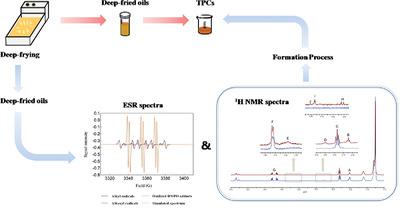当前位置:
X-MOL 学术
›
Eur. J. Lipid Sci. Technol.
›
论文详情
Our official English website, www.x-mol.net, welcomes your
feedback! (Note: you will need to create a separate account there.)
Formation of Polar Compounds During Deep‐frying—Determination by 1H NMR and ESR
European Journal of Lipid Science and Technology ( IF 1.8 ) Pub Date : 2020-05-14 , DOI: 10.1002/ejlt.201900363 Xiaodan Li 1 , Jinwei Li 2 , Yong Wang 3 , Yuanfa Liu 2
European Journal of Lipid Science and Technology ( IF 1.8 ) Pub Date : 2020-05-14 , DOI: 10.1002/ejlt.201900363 Xiaodan Li 1 , Jinwei Li 2 , Yong Wang 3 , Yuanfa Liu 2
Affiliation

|
The present study aims to elucidate the factors influencing the generation of polar compounds in oils during deep‐frying. Oils with different fatty acid compositions, including palm oil (PO), refined palm kernel oil (RPKO), and refined coconut oil (RCO), are applied in successive frying processes. 1H NMR spectra reveal that heated PO has a higher percentage of allyl acyl group and is more prone to formation of non‐polar dimeric triglycerides as compared to other types of oils. In addition, electron spin resonance (ESR) spectra indicate that alkyl radicals are more predominant than alkoxy radicals in heated PO. In contrast, RPKO and RCO are inclined to generation of alkoxy radicals during the thermal treatment. The results reveal that oils with high unsaturated fatty acid content are more prone to generation and oxidation of non‐polar dimeric triglycerides.
中文翻译:

油炸过程中极性化合物的形成-1H NMR和ESR测定
本研究旨在阐明油炸过程中影响油中极性化合物生成的因素。具有不同脂肪酸组成的油,包括棕榈油(PO),精制棕榈仁油(RPKO)和精制椰子油(RCO),可用于连续油炸过程中。1个1 H NMR光谱显示,与其他类型的油相比,加热的PO具有更高百分比的烯丙基酰基,更易于形成非极性二聚甘油三酸酯。此外,电子自旋共振(ESR)光谱表明,在加热的PO中,烷基自由基比烷氧基自由基更为重要。相反,在热处理期间,RPKO和RCO倾向于生成烷氧基。结果表明,不饱和脂肪酸含量高的油更易于生成和氧化非极性二聚甘油三酸酯。
更新日期:2020-05-14
中文翻译:

油炸过程中极性化合物的形成-1H NMR和ESR测定
本研究旨在阐明油炸过程中影响油中极性化合物生成的因素。具有不同脂肪酸组成的油,包括棕榈油(PO),精制棕榈仁油(RPKO)和精制椰子油(RCO),可用于连续油炸过程中。1个1 H NMR光谱显示,与其他类型的油相比,加热的PO具有更高百分比的烯丙基酰基,更易于形成非极性二聚甘油三酸酯。此外,电子自旋共振(ESR)光谱表明,在加热的PO中,烷基自由基比烷氧基自由基更为重要。相反,在热处理期间,RPKO和RCO倾向于生成烷氧基。结果表明,不饱和脂肪酸含量高的油更易于生成和氧化非极性二聚甘油三酸酯。











































 京公网安备 11010802027423号
京公网安备 11010802027423号